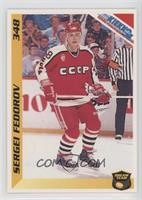The Stanley Cup Playoffs will commence shortly, and that means there is no time like the present to talk some hockey. And given the current state of relations between the United States and Russia, the Cold War era zeitgeist of the late 1980s/early 1990s is the status quo once again.
With that in mind, the thrilling story of how the Detroit Red Wings smuggled in eventual club legend Sergei Fedorov, a tantalizing tale that many of us haven’t heard before, is more relevant than ever.
In “The Russian Five: A story of espionage, defection, bribery and courage,” Keith Gave, a former spy who would later become a journalist, revealed his clandestine mission to Helsinki, Finland, which covers how Sergei Fedorov, Slava Fetisov, Vladimir Konstantinov, Slava Kozlov and Igor Larionov were all able to somehow slip out of the Communist USSR.
Their destination was decaying, extreme urban blight Detroit in the early ’90s, where they helped build a dynasty. The Detroit Free Press published an excerpt of his book, in five parts, in spring of 2008.
Here is the link to the first, but I suggest you read the whole series.
Gave was asked by Red Wings executive vice-president Jim Lites to pass a secret message to Fedorov at an exhibition game in Helsinki where his Soviet national team was playing an elite Finnish club.
In August 1989, Gave, who spent five years in the US Army as a Russian Linguist, somehow managed to meet with Fedorov and Konstantinov, whom the Wings had also drafted, and slipped them each a Red Wings media guide with a letter hidden inside that made it clear the Red Wings wanted both of them in Detroit and were willing to do what was needed to get them there.
“I remember that there was a wonderful story of how the Redwings like smuggled him out,” said Jeremy Ross, a former television newsman, long time sports card collector/seller (30 years) and industry advocate.
“I feel like it’s (collecting Fedorov’s cards) worthy of (investment) consideration for historical purposes. I will also say that there were a handful of Russian players who came before him, but this was different.
“This was a star player in his prime/approaching his prime, a young elite talent that the Redwings snatched from Russia and brought him into the United States.”
Ross, a former reporter for WBBM CBS 2 Chicago, Detroit metropolitan area native and Red Wings fan continued:
“And I think that the historical importance of that is worthy of investment consideration. I recall it being fascinating. I think it involves either trench coats or leading him through various backdoors. And at one point, running away until he was successfully defected.”
At the time of his defecting, Red Army coach and commander, Viktor Tikhonov wanted to promote Fedorov from private to lieutenant, but it also meant that Sergei would have to sign a 25-year contract.
Today, he is a Colonel in the Russian Army as well as the current head coach and General Manager of CSKA Moscow of the Kontinental Hockey League (KHL).
Obviously, he mended the fences,” added Ross.
“His story of being one of the first great Russian athletes to defect to the United States/one of the first big name defectors from the Soviet Union, is worthy of consideration (on the list of the top individual players for hockey card investments), if we put aside the USA-Russian tensions for a moment.”
Indeed what’s going on in the world right has made the spy thriller story of how Sergei Fedorov escaped the Iron Curtain to dominate the NHL as relevant as ever today.
Fedorov would go on to become a Hall of Famer, one of the best 100 NHL players of all time, and has a permanent place on Redwings Mt. Rushmore. Considered one of the most clutch and postseason players of all-time, he owns the career overtime points record, and he previously tied the record for Regular season overtime goals.
The first non-Canadian to win the Hart Memorial Trophy (MVP) he was also the first Russian player to reach 1,000 NHL points.
He was also once married to tennis player Anna Kournikova. Fedorov played in over 1,200 NHL games and scored 483 goals in the NHL, where he won three Stanley Cups with the Wings.
Paul M. Banks is the owner/manager of The Bank (TheSportsBank.Net) and author of “Transatlantic Passage: How the English Premier League Redefined Soccer in America,” as well as “No, I Can’t Get You Free Tickets: Lessons Learned From a Life in the Sports Media Industry.”
He has regularly appeared in WGN, Sports Illustrated and the Chicago Tribune, and co-hosts the After Extra Time podcast. Follow him on Twitter and Instagram.








